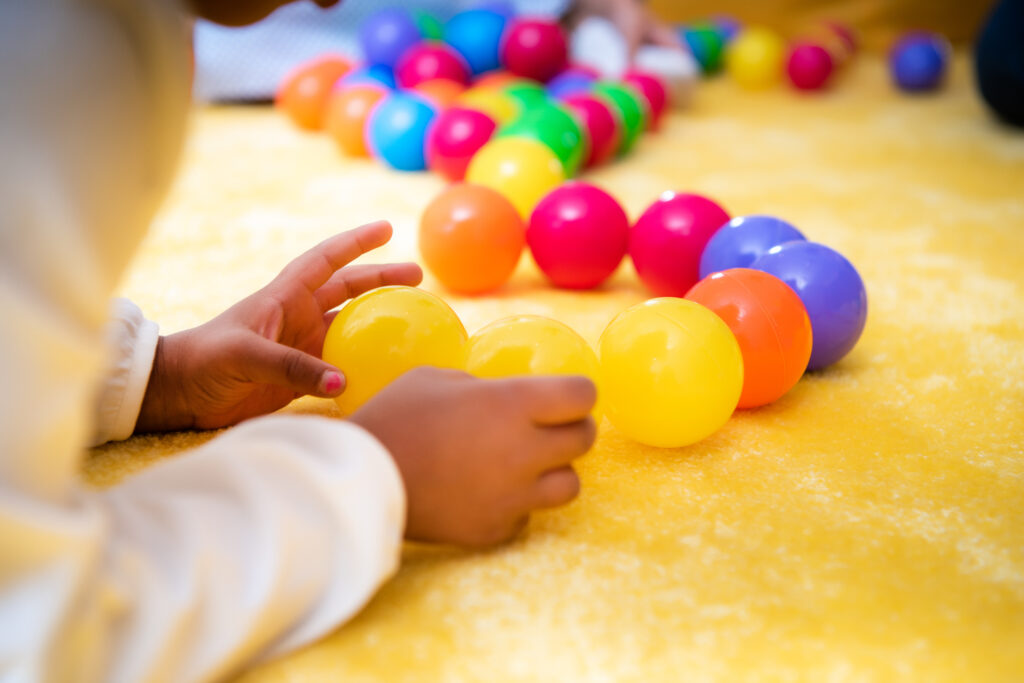Categories
book live demo
Ready to get started?
Create your No Obligation Account or book a Live Demo today!
create account
Tags
12 Benefits of Sensory Play for a Baby’s Development
September 13, 2024
Sensory play is essential to your baby’s development, engaging their senses—touch, sight, sound, taste, and smell—to help them explore and understand the world around them. These activities are not only enjoyable but also play a crucial role in promoting cognitive, physical, social, and emotional growth.

Here are 12 key benefits of sensory play for a baby’s development:
1. Enhances Brain Development
Sensory play stimulates nerve connections in the brain, supporting cognitive development and helping your baby learn about their environment. Through interaction with various textures, sounds, and smells, your child’s brain creates pathways that enhance learning and memory.
2. Develops Fine Motor Skills
Activities like handling small objects, squeezing playdough, or manipulating water toys strengthen your baby’s fine motor skills. These movements are essential for future tasks such as holding a pencil, using utensils, and improving hand-eye coordination.
3. Improves Gross Motor Skills
Sensory play often involves full-body movements, such as crawling through different textures, reaching for toys, or balancing while playing with water. These activities help strengthen large muscle groups and improve your baby’s overall coordination and gross motor skills.
4. Encourages Problem-Solving
Sensory play offers opportunities for your baby to explore and overcome challenges, which enhances problem-solving skills. Whether it’s figuring out how to stack blocks or observing how objects move through water, sensory play helps your child think critically and experiment with solutions.
5. Supports Language Development
As your baby engages in sensory play, they encounter new objects and experiences that spark curiosity. Describing textures, sounds, and visual elements—using words like “soft,” “rough,” or “smooth”—helps build vocabulary and strengthens communication skills as they associate words with their sensory experiences.
6. Boosts Social Interaction
Sensory play often takes place in group settings, promoting social interaction among babies. Sharing toys, playing alongside peers, and participating in group activities teach cooperation, turn-taking, and social bonding, laying the groundwork for healthy relationships in the future.
7. Fosters Emotional Regulation
Sensory play can help babies learn to self-soothe and regulate emotions. Engaging in calming activities, like squeezing a soft toy or running fingers through sand, enables children to manage stress and anxiety. This builds emotional resilience and prepares them to cope with new or challenging situations.
8. Stimulates Curiosity and Creativity
Through sensory experiences, babies are encouraged to explore and experiment in a safe environment. Open-ended play fosters creativity and curiosity, inspiring them to think outside the box and interact with their surroundings in imaginative ways.

9. Builds Cognitive Skills
When your baby explores different objects—comparing wet versus dry or smooth versus rough—they’re developing cognitive skills. Sensory play lays the foundation for critical thinking, problem-solving, and categorization, all essential for intellectual growth.
10. Encourages Independence
As babies engage with sensory materials, they gain confidence in making decisions and choices independently. Sensory play allows them to explore at their own pace, fostering a sense of self-reliance and autonomy as they make discoveries on their own.
11. Develops Spatial Awareness
Sensory activities such as sorting, stacking, or fitting objects together help your baby understand spatial relationships. This promotes awareness of size, shape, and space, essential for navigating their environment and developing early math concepts like geometry.
12. Promotes Mindfulness and Focus
Sensory play captivates a baby’s attention, helping them focus on a single activity for an extended period. This practice enhances mindfulness and improves concentration, which can lead to longer attention spans as they grow older.
Sensory play is more than just a fun activity—it’s a fundamental part of your baby’s developmental journey. Each sensory experience, whether it involves squishing, stacking, or sorting, contributes to their cognitive, motor, emotional, and social growth.
Childcare providers can easily incorporate enriching sensory activities into daily routines using ChildFriendly, a childcare management platform that simplifies scheduling and tracks developmental progress. Learn how ChildFriendly can enhance the learning environment for your daycare by visiting ChildFriendlyPro.com.
Leave a Reply Cancel reply
Solutions
Registration & Waitlist Management
Billing & Financial Management
Automation, Tracking, & Reports
Attendance & Check In
Classroom & Learning Management
Parent Engagement & Communication
Staff Scheduling & Management
Modern Platform & Easy Set Up
Resources
Resource Center
FAQ
About Us
Pricing
Careers
Privacy Policy
Trust & Security
Monday - Friday,
9:00am - 5:00pm MST
Connect With Us
Rocky View County, AB, CA
T4B3L5
book live demo
Terms of Use
create account
contact us
© 2024